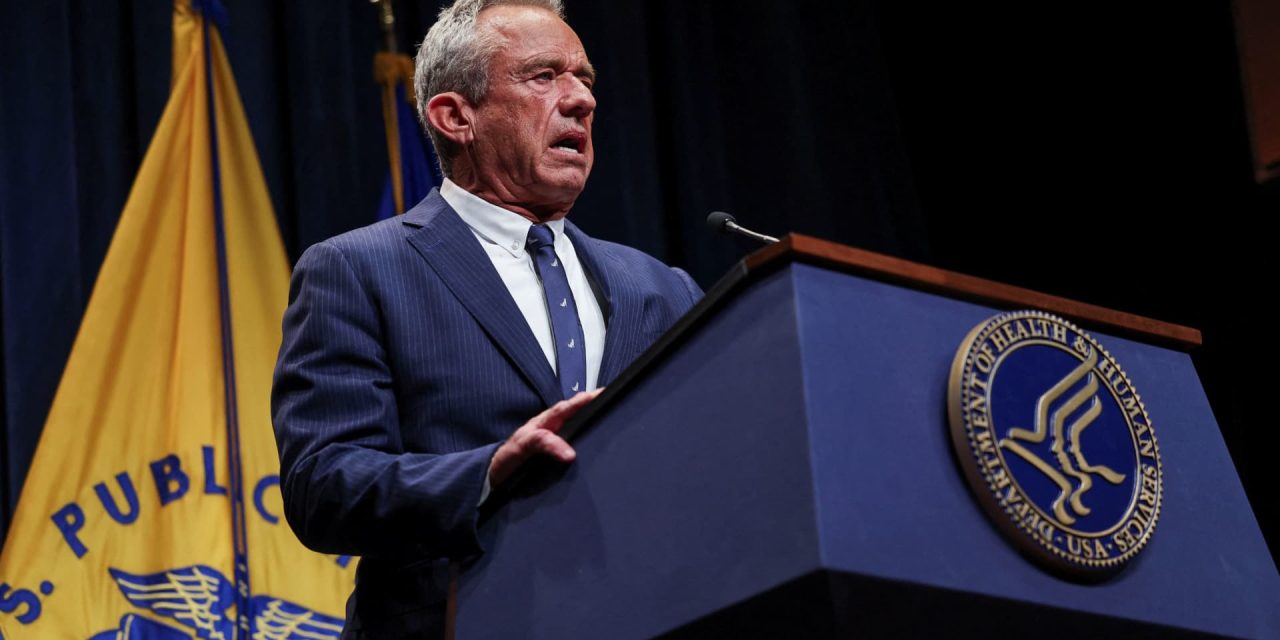
New study throws doubts about the reasons of RFK Jr. for the excerpt in the vaccine

The secretary of the US Health and Human Services (HHS), Robert F. Kennedy Jr., speaks when he participates at a press conference with centers for Medicare and Medicaid services Mehmet OZ to discuss the health insurance of health insurance at the Department of Health and Human Services in Washington, DC on June 23, 2025.
Kevin Mohatt | Reuters
A version of this article was first published in CNBCS Healthy Return’s newsletter, in which the latest health news leads directly to their inbox. Subscribe here to get future expenses.
Robert F. Kennedy Jr., Secretary for Health and Human Services, recently disappointed an important state vaccine panel and said that it was necessary to remove what he described as “persistent conflicts of interest” in the committee.
New research results of the USC Schaeffer Center for Health Policy & Economics seem to question this argument. Conflicts in these centers for the control and prevention of diseases have been on “historical lows” for years before Kennedy repeated it with new members, some of whom are well -known vaccine critics, the researchers found.
The study published on Monday, published in the Medical Journal Jama, also showed that the type of conflict, which was considered “most worrying” – was practically eliminated by the members of the members of the Choir Committee on Immunization Practices or ACIP.
The interest conflicts were also low at a separate advisory committee of the Food and Drug Administration as vaccines and related biological products.
Both groups are crucial for the design of the US vaccine policy: While the agency’s FDA committee advises whether shots should be approved, the CDC committee determines who is entitled to JABS and whether the insurers should cover them. The panels usually consist of top experts for infectious diseases, pediatrics, immunology and public health.
Kennedy has long claimed that the consultants of these panels have close relationships with the pharmaceutical industry. At his first hearing to confirm the Senate in January, Kennedy claimed that 97% of the members of the CDC committee had conflicts of interest.
“Before it was confirmed, I saw this 97% number and thought that there were some serious things. But after I had looked at the vaccine data myself, I could certainly see nothing of this size,” said the leading author of the study in an interview.
“I think it will be the public and that [Trump] Administration that problems that we thought were quite serious or were serious in the past were no longer, ”she added.
As Kennedy, a prominent vaccine skeptic himself, the health authorities of the federal government is overhauled and pursues efforts that change the immunization policy and undermout the vaccine in the United States
The USC researchers analyzed financial interests among experts for the two vaccine boards between 2000 and 2024.
The conflicts of interest on the panels, which meet several times a year to check vaccines several times a year: For every product that is discussed, the members must say whether they have a tie to the vaccine manufacturer or a competitor and disclose the nature of the relationship. People on the committee with conflicts either receive a waiver of participation if they are regarded as essential specialist knowledge, while those with excessive conflicts are withdrawn.
According to the paper, an average of 6.2% of the ACIP members and 1.9% of the VRBPAC members have reported a financial conflict of interest at a certain session since 2016. During this period, less than 1% of the conflicts reported in both panels were bound to the personal income of vaccines, including advice fees, stocks, license fees or property.
The reported conflicts between ACIP members fell to 5% by 2024 and have remained under 4% at VRBPAC members since 2010, including 10 years in which no conflicts were reported at all.
The interest rate conflicts were significantly higher in the early 2000s and achieved around 43% for ACIP and 27% for VRBPAC at ACIP in 2007, as the researchers found.
The study states that the decline over the years could be due to political changes in 2007, which are due to conflicts of interest in the FDA committee, as well as “greater awareness and review” of the conflicts in the agency’s decision-making. It is not clear when exactly the CDC committee did the same.
During the entire study period, the most frequently reported conflicts of interest was the research support, which is generally less important than financial bonds associated with personal income. Kanter said this was a reflection of the fields of the panel members who are relevant for the evaluation of security, effectiveness and applicability of shots.
“The dominant conflicts were to grant support for research. In a way that makes sense because we want to in these committees?
“These conflicts are not about personal profit, but about specialist measures.”
While some of the rates seem to be higher in ACIP members than with people of the VRBPAC committee, Kanter did not say comparable because the CDC provides “far less detailed” data on conflicts of interest. She added that the FDA committee typically checked one product during a session, while the CDC committee rates several.
Kanter said it was important to examine conflicts of interest and the influence of the pharmaceutical industry in many aspects of health regulation.
However, she added that “if we want to concentrate on conflicts of interest, there may be other areas in which prevalence is a bigger problem than what we have seen here with these vaccine boards.”
Feel free to send Annikakim.constantino@nbcuni.com tips, suggestions, ideas and data to Annika.
Buffett Bounce from Unitedhealth stops in the healthcare system for the time being
Warren Buffett was exactly what the doctor had stabilized Unitedhealth Group Shares.
The 13F registration from Berkshire Hathaway, which unveiled a new participation of more than 5 million shares, contributed to lifting the stock over $ 300-away from the 52-week low of less than $ 235, which it reached at the beginning of this month.
This is Berkshire’s first excursion to the complicated area of managed care. The Appaloosa Fund from David Tepper also provided a vote of trust in the shares of the competitive health giant and increased its share to 2.5 million shares.
For both it is a bet on recovery, but analysts say that waiting could take well over a year. When evaluating the purchases, Baird analyst Michael Ha Warren Buffett’s own words called “complicated, uncertain investments”, which belong in the “too hard stack”.
In a reference to the customers, HA wrote that the problems of Unitedhealth about pricing in his Medicare advantage plans for real structural problems with his optum health doctor unit, which are not so easy, extend. HA added that “the short -term execution risk is high and that we see the potential that the situation deteriorates in the next 12 to 18 months before it improves.”
For the time being, Unitedhealth shares have been exceeded for the first time on their sliding 50-day average since the company in April.
Feel free to send tips, suggestions, stories ideas and data to Bertha at Bertha.coombs@nbcuni.com.
Latest in the healthcare system Tech: Epic Touts New AI tools in the annual user group meeting
Epics campus in Verona, Wisconsin
With kind permission: epic
This is Ashley, who reports live from Verona, Wisconsin.
It is this season again! I take part in the annual user group assembly of EPIC, in which thousands of health care managers flock to the company’s 1,670 hectare headquarters in order to learn more about the latest products and functions of the company.
EPIC is a company for health software known for its electronic health records or honorary software. An honor is a digital version of the medical record of a patient who is cultivated by doctors and nurses over time. Epic is the dominant honorary provider in the United States, and according to the company, its technology is used in 3,300 hospitals and 73,000 clinics and 325 million patients all over the world.
The artificial intelligence was near and in the center in the UGM this year, similar to how it was last year. During a three-hour management address on Tuesday morning, epic managers shared updates about the approximately 200 new AI characteristics they developed for patients, clinicians and payers. Pay attention to an additional coverage of CNBC, which explains some of these upcoming functions in more detail.
Epic confirmed that it developed its own AI-driven clinical documentation instrument that was one of the most expected announcements of this year’s event. These tools, which are often referred to as AI fonts, can create clinical notes in real time when doctors record their visits to patients mutually.
A highly competitive AI writing market has been looking for solutions as managers in the healthcare system to reduce employees of employees and discouraging administrative workload. Some AI writing startups such as moving and ambience Healthcare have collected hundreds of million dollars from investors, and there was a lot of speculation about whether Epic finally joined the fight.
The company said it was working with Microsoft on this function and will be available for limited use at the beginning of next year.
“Ai is here, it accelerates, you cannot wish you, you have to keep pace with it,” said the President of Epic, Sumit Rana, during the address.
The presentations took place in the underground auditorium with the underground auditorium of Epic called Deep Space, which is only one of the many unique facilities on the campus. The Epic office buildings are discussed, many inspired by science fiction and stories such as “The Wizard of Oz”, the Harry Potter series and “Alice in Wonderland”.
UGM meetings are also discussed, and epic managers are famous for the stage in costumes. This year’s topic was “Sci-Fi”, and the 82-year-old founder and CEO of Epic, Judy Faulkner, wore a purple wig, light green shoes and a metallic vest that was inspired by the fictional figure Buzz Lightyear.
CNBC had the opportunity to put together in a rare interview with Faulkner at the beginning of this summer, in which she thought about her 46 years at the rudder of the company. During her presentation on Tuesday, Faulkner discussed the KI initiatives and the Roadmap of Epic.
“We combine human intelligence and curiosity with the investigative skills of Gen AI,” she said.
Many of the new features played on Tuesday on Tuesday are still several months or over a year. But it is clear that Epic relies on AI, and they have not allowed the UGM participants to forget it this year.
Read more about CNBC’s interview with faulkner.
Feel free to send tips, suggestions, story ideas and data to Ashley at Ashley.capoot@nbcuni.com.



























